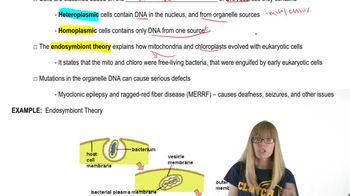Table of contents
- 1. Introduction to Genetics51m
- 2. Mendel's Laws of Inheritance3h 37m
- 3. Extensions to Mendelian Inheritance2h 41m
- 4. Genetic Mapping and Linkage2h 28m
- 5. Genetics of Bacteria and Viruses1h 21m
- 6. Chromosomal Variation1h 48m
- 7. DNA and Chromosome Structure56m
- 8. DNA Replication1h 10m
- 9. Mitosis and Meiosis1h 34m
- 10. Transcription1h 0m
- 11. Translation58m
- 12. Gene Regulation in Prokaryotes1h 19m
- 13. Gene Regulation in Eukaryotes44m
- 14. Genetic Control of Development44m
- 15. Genomes and Genomics1h 50m
- 16. Transposable Elements47m
- 17. Mutation, Repair, and Recombination1h 6m
- 18. Molecular Genetic Tools19m
- 19. Cancer Genetics29m
- 20. Quantitative Genetics1h 26m
- 21. Population Genetics50m
- 22. Evolutionary Genetics29m
3. Extensions to Mendelian Inheritance
Organelle DNA
Problem 22
Textbook Question
Textbook QuestionBecause offspring inherit the mitochondrial genome only from the mother, evolutionarily the mitochondrial genome in males encounters a dead end. The mitochondrial genome in males has no significant impact on the genetic information of future generations. Scientists have proposed that this can result in an accumulation of mutations that have a negative impact on genetic fitness of males but not females. Experiments with Drosophila support this possibility. What experimental data or evidence would you want to evaluate or consider to determine if an accumulation of mtDNA mutations negatively impacts the fitness of males of any species?
 Verified Solution
Verified SolutionThis video solution was recommended by our tutors as helpful for the problem above
Video duration:
1mPlay a video:
293
views
Was this helpful?
Related Videos
Related Practice
Showing 1 of 2 videos


